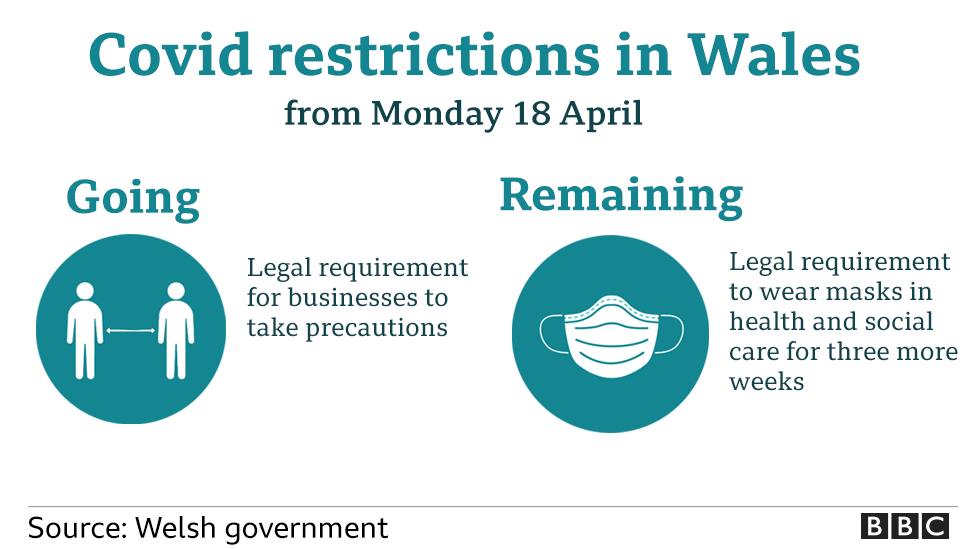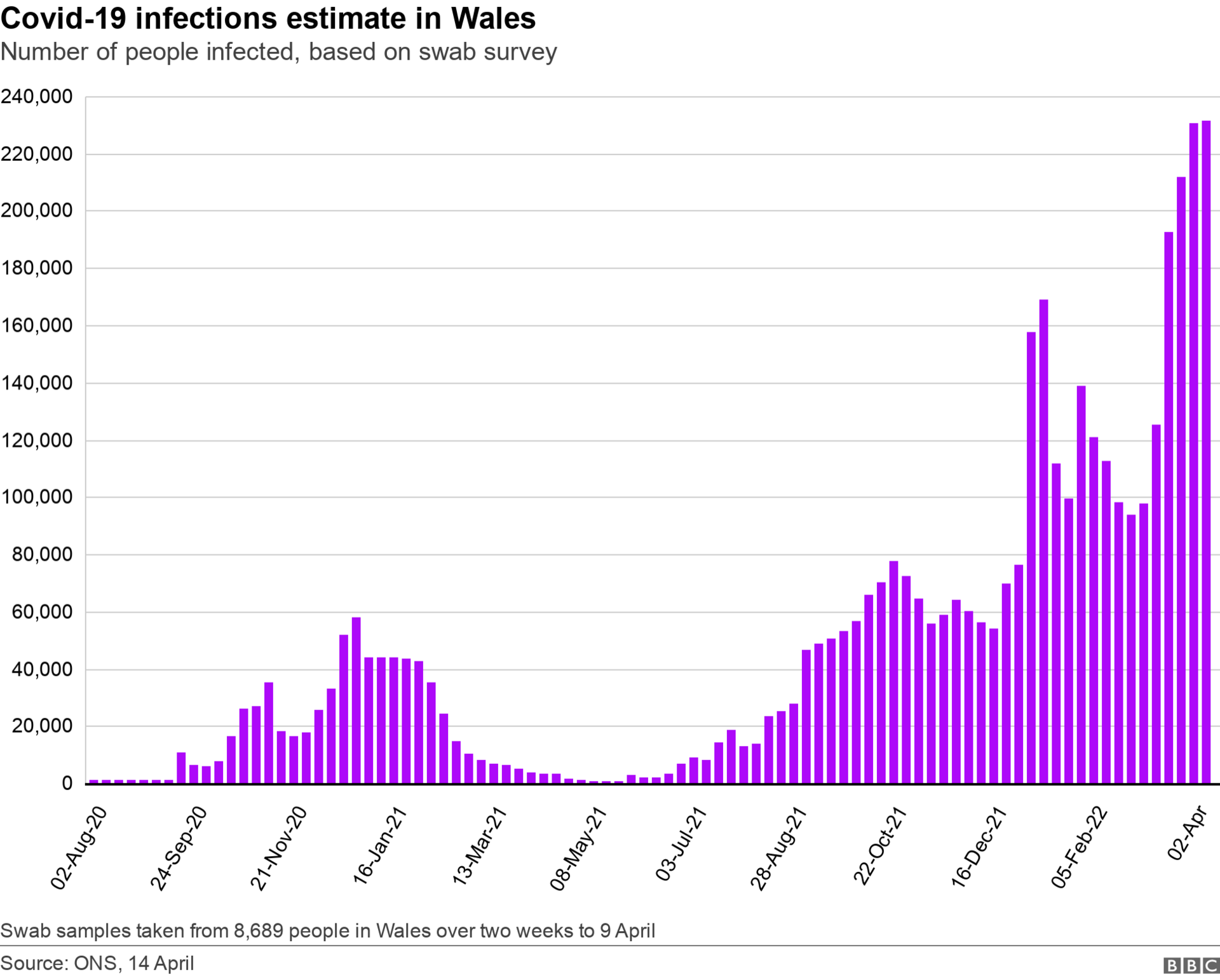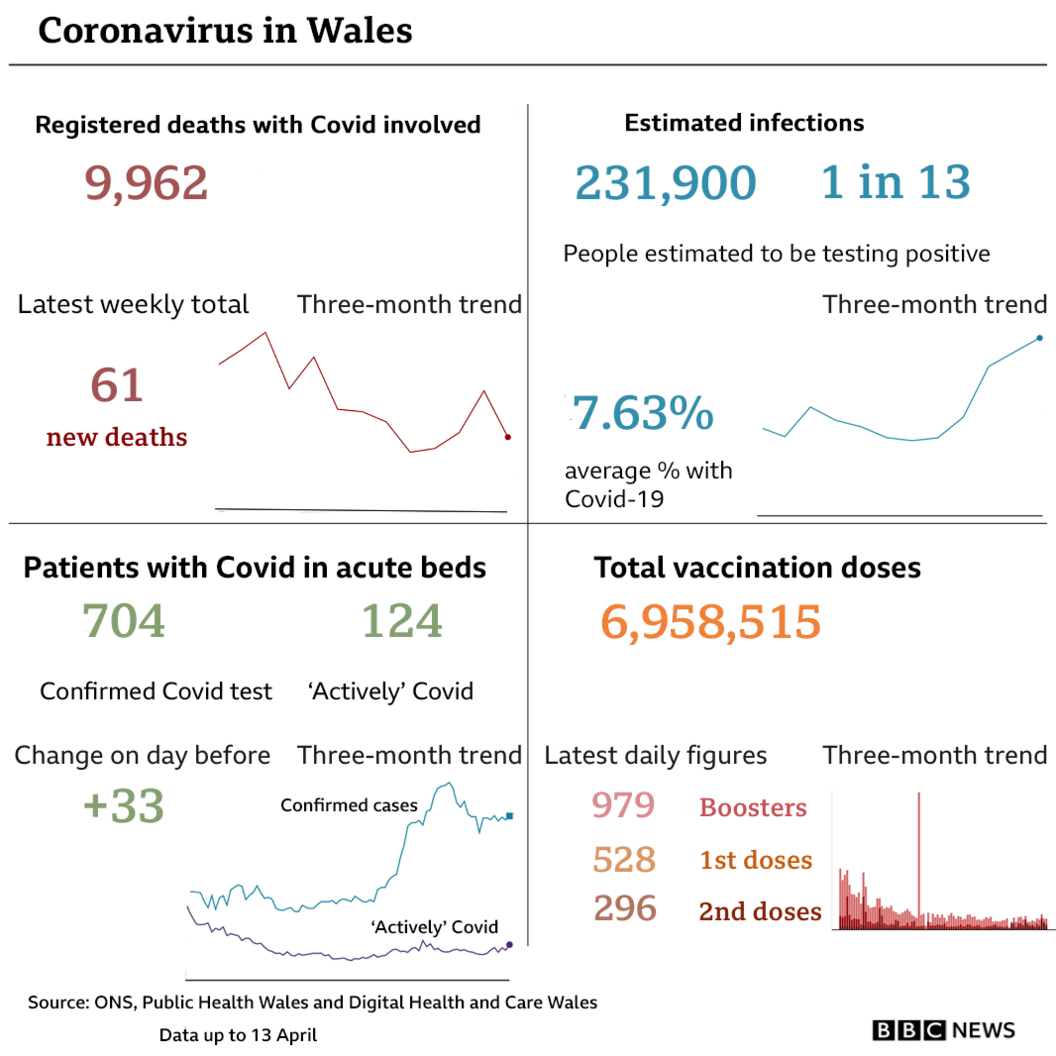Covid: Restrictions on Wales' businesses to end
- Published
- comments
Businesses will still be required to make risk assessments under existing legislation
A law requiring workplaces in Wales to take precautions for Covid will be axed from Monday.
It is one of two remaining Covid measures the Welsh government has in place.
Rules requiring facemasks in health and social care settings will remain in force for at least another three weeks.
First Minister Mark Drakeford said the mask rule would help control the spread of Covid where "some of the most vulnerable people" are treated or live.
The move to scrap restrictions on businesses came as the latest Office for National Statistics data indicated infections remain at record levels in Wales, with one in 13 people still estimated to have Covid in the latest week.
Mr Drakeford said firms will still be required to make risk assessments under existing legislation.
He told BBC Radio Wales Breakfast: "It certainly doesn't mean that businesses will be abandoning all the things that they put in place to keep their workers safe and to keep customers safe."
He said firms are telling ministers "they're determined to go on doing all of those things because they know it makes good sense for their business".
The last Welsh government review of coronavirus rules saw the end of the laws requiring people to wear face coverings in shops and on public transport, and to self-isolate if they catch coronavirus.
Both measures were replaced with guidance.

Under the law, companies and other organisations had been required to assess the risk coronavirus poses in their workplace.
They were required to take precautions from a shopping list of suggestions, such as ensuring premises are well ventilated, using screens or barriers and limiting close physical interaction, and could have faced fines if they ignored the rules.
The Welsh government said firms would "continue to be encouraged to take steps to operate in a Covid-safe manner".
Workplaces will still be subject to other legal responsibilities, such as under the Health and Safety at Work Act.
The Welsh Conservatives' Russell George said the changes were coming "too late with the long bank holiday weekend already on us".
He called for Mr Drakeford to use the next review to "finally announce an independent public inquiry into the Welsh government's handling of the pandemic that has seen Wales with the highest rate of deaths in the UK and record-breaking waiting lists".
Figures for deaths in Wales involving Covid, which do not adjust for age or population, across the whole of the pandemic period are higher in Wales than the other UK nations at 314.1 per 100,000 people.
When standardised for age the figure is 142.7, slightly lower than England's 143.2, but higher than Scotland and Northern Ireland.
'Absence remains a real problem'
Plaid Cymru's Peredur Owen Griffiths also called for a Welsh-only pandemic inquiry, adding: "Key worker illness and sickness absence remains a real problem for many services. That's why it's more important than ever that the Labour government provides a meaningful plan for NHS recovery."
Business groups welcomed the move.
CBI Wales' Leighton Jenkins said: "These recent changes will be welcomed by businesses, which are under strain due to rising energy costs and inflation."
Ben Cottam, head of the Federation of Small Businesses Wales, added: "Business will continue to do everything they can to ensure customers and staff are safe."
Shavanah Taj, general secretary of the Wales TUC group of trade unions, said employers "still have a legal obligation to ensure the safety and security of their workers".
"Employers must continue to assess the physical environment and working practices in order to safeguard against the spread of infection."
Leader of the Welsh Liberal Democrats, Jane Dodds, also welcomed the decision and called for the fourth booster vaccine to be opened up to those under 75 who want it.
'Frustrated and angry'

Michael Kill says the industry does not take safety lightly
Meanwhile, Night Time Industries Association's Michael Kill said a Welsh government Freedom of Information request showed there was no evidence to support the closure of nightclubs last year.
Mr Kill told Radio Wales Breakfast the findings left many in the sector feeling "frustrated and angry".
"The response that we got... was it is not possible to establish exactly where someone caught Covid," he said.
"Therefore, it's not possible to provide the number of cases that were caught in specific venues. Welsh government does not hold that information." he added.
He said the sector was not surprised by the response, which showed evidence was "anecdotal", but said there had been a "huge impact" on businesses, with over a third of nightclubs now closed across the UK.
In response, the Welsh government said its approach has been "informed by the latest available scientific and medical advice".
It added that "Increasing the number of people at a venue without increasing the size of the venue or otherwise mitigating appropriately will increase the risk of transmission. SAGE highlighted the highest risks of transmission are associated with poorly ventilated and crowded indoor settings."
Mr Drakeford said nightclubs were "high-risk" and have been associated with super-spreader events "across the world".
"The evidence from the Sage committee said the transmission of the virus was strongly associated with a proximity and duration of contacts in indoor environments," he added.

Infection estimates remain high
Covid infections remain at record levels in Wales, according to the Office for National Statistics (ONS), with one in 13 people still estimated to have Covid in the latest week.
It is estimated 231,900 people in Wales had Covid in the week ending 9 April.
That equates to 7.63% of the population and is a slight increase on the previous week's estimate, which was that 230,800 people were infected and suggests they may be flattening.
The estimate for Wales is a higher than those in the other UK nations, where infections were estimated to be decreasing. It was also higher than in all English regions except the north east.
Infections are estimated to involve one in 14 people in England, one in 17 in Scotland and one in 19 in Northern Ireland.


Mr Drakeford told BBC Wales, later on Thursday, that Covid "in general" has been "stabilising in Wales over the last three weeks, albeit at very high numbers".
He said there were "just the beginnings of signs that maybe the BA.2 wave of Omicron is passing its peak and numbers are beginning to come down".
Meanwhile, the numbers of patients with Covid in hospital beds has averaged 836 over the last week - slightly up on the previous seven days. Numbers in critical care are averaging 19 a day, a small rise on a week ago but half the numbers at the peak we saw in January.
However, more than 84% of patients with Covid in acute beds are being treated for other conditions, reflecting the high numbers of Covid infections in the community. Only 124 patients with Covid on Wednesday were being primarily treated for the virus.
But the chief medical officer for Wales warned that the health and care system continued to struggle with Covid demands and high levels of staff absence.

Mark Drakeford has warned people that the pandemic is not over
Earlier this week registered deaths involving Covid in Wales rose to their highest weekly total in two months, according to the ONS.
In the most recent week, up to 1 April, 61 people in Wales had a death registered which involved Covid - and saw it included as a contributory factor on a death certificate.
It was the highest weekly total since early February - there were 45 deaths registered in the previous week.
The next three-weekly review of coronavirus regulations is expected around 5 May.
- Published1 July 2022

- Published28 March 2022
